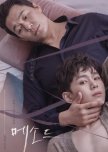
This review may contain spoilers
Multi-Layered Queer Self-Discovery
After all the dramas I've watched, it was this one that made me finally write a review.This is an amazing "play" within a play that messes with your mind the way the main character's mind is messed with. Reviews disappointed with the tragic queer trope need to dig a little deeper. The two leads are chained by different things in life--idol life, being in the closet. The play, "Unchain," releases them. Their decisions at the end, however, play out naturally.
The actors and their chemistry is insane. The way the movie is filmed is so raw with how closely the camera follows Jae Ha. You feel what he feels--the push, the pull, the emotions from Young Woo. You start to believe it.
I think the best line to summarize Young Woo's motivation, his final hook into Jae Ha: “Stay with me, hyung? My manager will let me go if I leave with you.”
Even the nonverbals are heavy with meaning. Before that line, Jae Ha was told to place a hand on Young Woo's shouder--the dominant, older male role. But in that small moment of intimacy for the quote, Young Woo places a hand on Jae Ha and draws him in.
Young Woo’s oppressive life is real. Jae Ha feels bad for Young Woo and is pulled in even more. (Young Woo's motivations are so multi-layered in that quote: he could be lonely and wants a friend or a lover. He could be trying to manipulate Jae Ha to get him closer. )
The dialogue starts off pretty grounded, but the deeper you go, the more twisted the words get. It's easy to take the last half of the movie as a huge metaphor, and, if you do, I think it makes the movie more intentional. The play can be a presentation of Jae Ha's turmoil.
You can argue that Jae Ha returns to his chains at the end of the movie. Young Woo clearly does since he’s still an idol. But I think, on the inside, they’ve been unchained. When Young Woo, like an eager puppy, asks to follow Jae Ha on his path of character discovery, I think he’s definitely discovered more than just his skill and his enjoyment of acting. For a more positive queer spin, I think he could have discovered another part of himself. Jae Ha may also have discovered that, too. Even though he goes back to Hee Won physically, I think he’s changed since he became the character--a huge hint was his character notebook. Although there isn’t a closed ending, I think it accurately reflects life and how you change gradually. But there’s no denying that this play has changed both our leads and immensely impacted mine. Amazing through and through.
Positives
-Acting: Every moment Park Song Woong and Oh Seung Hoon are on screen, they're emoting. Not a moment is wasted.
-Camerawork: up close, personal, raw
-Dialogue: The lines are succinct and sharp, especially the ones lifted from the play.
-Plot: The parallels are straightforward but powerful. Very multi-layered, each scene ladened with meaning and symbolism
"Negatives"
-I almost want to say there wasn't enough skinship, but wow, their steamy scene is one of the best I've seen in a queer Asian drama (yes, even among the Thai BL ones). It's so heavy with emotion and meaning that it carries the intimacy needed for the plot
Overall, the movie is one of those that makes me want to pick apart, like one of those dense classic books they make you read in high school. Excellent!
Was this review helpful to you?


